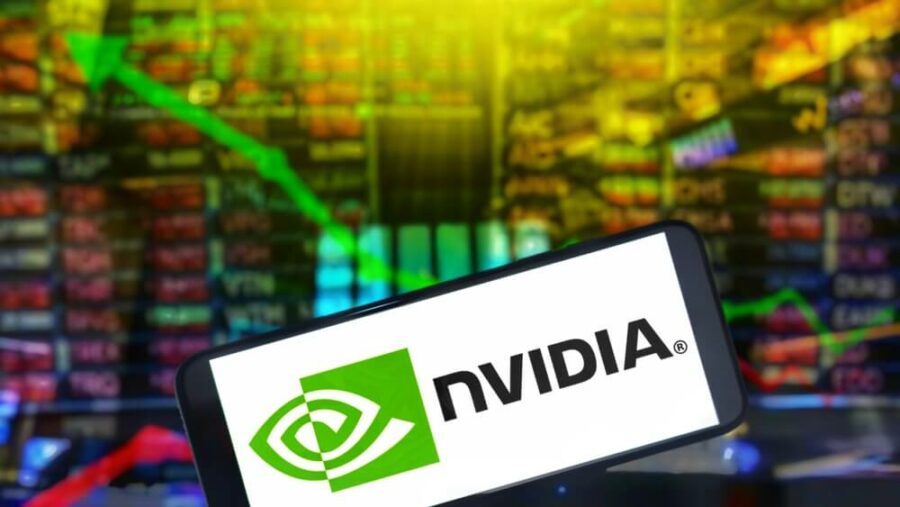Nvidia, which uses its cutting-edge chips to power data centers used in generative AI products such as ChatGPT, has become the first chipmaker to join the trillion-dollar club and far ahead of its peers.
Taiwan Semiconductor Manufacturing Co Ltd is the world’s second-largest chip manufacturer, valued at $535 billion.
Shares of “Nvidia” rose more than 4 percent to $ 406.1 in early trading in New York on Tuesday, after its CEO Jensen Huang launched a new supercomputer and struck new artificial intelligence alliances with companies including WPP and SoftBank on Monday.
Nvidia impressed investors and analysts last week, predicting sales to rise to $11 billion in the three months ending in July, beating Wall Street’s previous forecast by more than 50 percent.
Headquartered in Silicon Valley, NVIDIA began targeting the niche market for 3D computer graphics 30 years ago. Its chips power artificial intelligence applications including ChatGPT, OpenAI’s super bot, as big tech companies and cloud computing providers race to upgrade their data center technology for what Huang declared Monday “the tipping point in the new computing era.”
Over the past few years, Nvidia, known for its chips used in video games, has focused on the data center market.
The company’s business expanded rapidly during the pandemic when the games took off, cloud adoption increased and cryptocurrency enthusiasts turned to its chips for coin mining.
Read: The dark side of ChatGPT
The data center chip business accounted for more than 50 percent of the company’s revenue in the fiscal year ending Jan. 29, Reuters reported.
Anvidia’s trillion-dollar market capitalization puts the company in an elite group of US stocks dominated by big tech companies that include Apple, Microsoft, Amazon and Google’s parent company Alphabet, according to the Financial Times.
Meta reached the trillion dollar mark in June 2021, when it was still called Facebook but fell below the minimum just a few months later.
Amazon became the first public company to lose a trillion dollars in market value in November amid a large-scale sell-off in tech stocks last year.
Morgan Stanley described the high forecast announced by Anvidia last week as “the largest increase in dollar revenue in the history of the industry,” adding: “We have no historical precedent for the scale of this move.”
Zeno Mercer, senior research analyst at Robo Global, said the reason Invidia is seeing so much demand and enjoying this growth is that it already provides the technology needed to serve this wave of innovation and use. She is “currently in the first place.”
The recovery has extended to shares of other chipmakers who are also expected to benefit from the AI boom.
Some stocks seen as winners in AI – such as semiconductor makers and software developers – have doubled in value as traders bet on exponential growth in the industry, even as fears of waves of job losses mount as daily tasks become automated.
Goldman Sachs analysts estimate that U.S. investment in artificial intelligence could approach 1 percent of the country’s economic output by 2030.
What is the role of NVIDIA in the AI boom?
In a Reuters report, large computers that process data and generate power run on powerful chips called graphics processing units (GPUs). InVidia produces about 80 percent of its GPUs, according to analysts.
GPUs are designed to handle a specific type of mathematics involved in AI computing with high efficiency. By contrast, general CPUs from companies like Intel handle a wider range of computing tasks less efficiently.
OpenAI’s GPT chat, for example, was created with thousands of graphics processing units (GPUs) produced by Anvidia. The Financial Times reported in April that Tesla CEO Elon Musk had also secured GPUs from Nvidia to get him started in the AI space.
Worries about the rise of artificial intelligence
However, experts have expressed concern about the rise of artificial intelligence. A group of business leaders and experts, including ChatGPT creator Sam Altman, warned in a statement posted online Tuesday that the rise of artificial intelligence carries the risk of “extinction” for humanity.
The signatories of the statement, published on the website of the US-based nonprofit organization Center for AI Safety, said combating AI-related risks should be “a global priority like other community-wide risks, such as pandemics and nuclear wars.”
Jeffrey Hinton, who co-signed the statement and is considered one of the founding fathers of artificial intelligence, warned of its dangers when he left his position at Google in early May.
For more tech news, click here.








